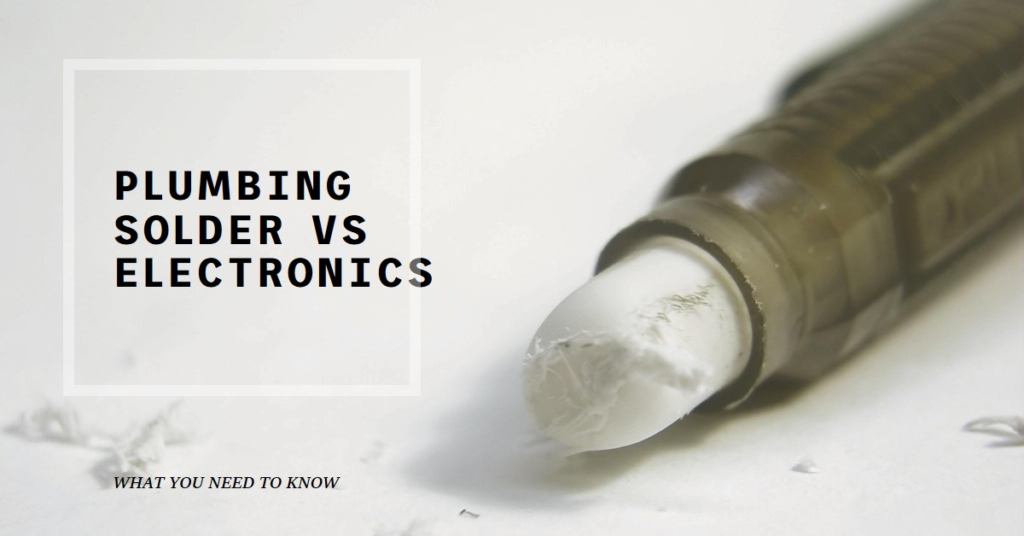
Table of Contents
- Introduction: Bridging the Gap Between Plumbing and Electronics
- Understanding Solder: A Fundamental Component
- Composition Matters: Analyzing the Differences
- Melting Points: A Crucial Consideration
- Mechanical Strength: Matching the Requirements
- Corrosion and Long-term Reliability
- Health and Safety Considerations
- Cost vs. Quality: Weighing the Options
- Practical Recommendations: Best Practices
- Conclusion: Making Informed Decisions
Introduction: Bridging the Gap Between Plumbing and Electronics
In the intricate world of electronics, soldering is an essential skill, often determining the reliability and longevity of a project. While plumbing solder might seem like a viable alternative due to its availability and cost, there are significant differences between plumbing and electronic soldering materials that must be understood. This blog post explores whether plumbing solder can be used for electronics and what considerations must be taken into account.
Understanding Solder: A Fundamental Component
Solder serves as the glue that holds electronic components together, providing both mechanical support and electrical connectivity. The composition of solder can significantly impact the performance and durability of an electronic circuit. Typically, electronic solder is composed of a combination of tin and lead or other metals, creating a eutectic mixture that melts at a lower temperature and ensures a reliable joint.
On the other hand, plumbing solder is designed primarily for joining metal pipes and fittings. It often contains a higher percentage of lead or other metals that are not suitable for electronic applications. The requirements for plumbing solder are vastly different from those for electronics, particularly in terms of melting point, mechanical strength, and corrosion resistance.
Composition Matters: Analyzing the Differences
One of the most significant differences between plumbing and electronic solder is the lead content. Plumbing solder typically contains a higher percentage of lead, which can be detrimental to electronic components. Lead-free solder, often used in plumbing to comply with health regulations, is not always suitable for electronics due to different melting temperatures and mechanical properties.
Flux is a crucial component in soldering, acting as a cleaning agent to remove oxides and ensure a strong bond. Plumbing solder often uses acid-based flux, which can be corrosive to electronic components. Electronic solder, however, uses rosin-based flux, which is specifically designed to be non-corrosive and safe for delicate electronic circuits.
Melting Points: A Crucial Consideration
Electronic solder is designed to melt at lower temperatures, typically around 183°C (361°F) for traditional tin-lead solder and slightly higher for lead-free variants. This lower melting point is crucial for protecting sensitive electronic components from heat damage during the soldering process.
In contrast, plumbing solder usually melts at higher temperatures, around 230°C (446°F) or more. Using plumbing solder on electronic components can risk damaging the delicate parts due to the higher heat required. This difference in melting points underscores why plumbing solder is generally unsuitable for electronic applications.
Mechanical Strength: Matching the Requirements
Electronics require solder joints that are not only electrically conductive but also mechanically robust. The flexibility and strength of electronic solder are tailored to withstand the thermal and mechanical stresses that electronic devices encounter during operation.
Plumbing solder, however, is formulated for strong, leak-proof joints in plumbing systems. The mechanical properties are optimized for metal pipe connections rather than the fine and delicate leads of electronic components. This mismatch in mechanical requirements further highlights the unsuitability of plumbing solder for electronics.
Corrosion and Long-term Reliability
Corrosion is a significant concern in electronics, as it can lead to failure of solder joints and components over time. Electronic solder is specifically formulated to minimize corrosion, ensuring long-term reliability of the circuits.
Plumbing solder, especially those with acid-based flux, can introduce corrosive elements to electronic components. Even lead-free plumbing solders may contain substances that, over time, could degrade electronic circuits, leading to failures and potentially costly repairs.


Health and Safety Considerations
Using plumbing solder in electronics can pose health risks due to the higher lead content. Lead is toxic, and its use in electronics is regulated under various health and safety standards, such as RoHS (Restriction of Hazardous Substances Directive).
For electronic applications, it is essential to use solder that meets safety standards, minimizing exposure to hazardous materials. Lead-free electronic solders are widely available and are formulated to comply with these safety regulations, ensuring a safer working environment.
Cost vs. Quality: Weighing the Options
One might consider using plumbing solder for electronics due to its lower cost and availability. However, the initial savings can be deceptive when considering the potential long-term damage and reduced reliability of electronic components.
Investing in high-quality electronic solder is crucial for ensuring the performance and longevity of electronic devices. The cost difference is often marginal compared to the benefits of reliable and durable solder joints, making it a wise investment for any electronics project.
Practical Recommendations: Best Practices
For electronic projects, always opt for solder specifically designed for electronics. Look for lead-free options that comply with health and safety standards, and ensure that the flux is rosin-based and non-corrosive.
Adopting proper soldering techniques is equally important. Use a temperature-controlled soldering iron, and work in a well-ventilated area to minimize exposure to fumes. Practice precision and patience to achieve the best results.
Conclusion: Making Informed Decisions
In conclusion, while plumbing solder might seem like a convenient alternative, it is generally unsuitable for electronic applications due to differences in composition, melting points, mechanical properties, and safety considerations. Understanding these differences and investing in appropriate electronic solder is essential for the reliability and longevity of your electronic projects. Making informed decisions about the materials and techniques used in soldering can significantly impact the success and durability of your electronics.



